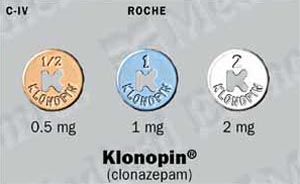Klonopin (Clonazepam) Patient Information
Find out why Klonopin is prescribed, side effects of Klonopin, Klonopin warnings, effects of Klonopin during pregnancy, more - in plain English.
Generic name: Clonazepam
Brand name: Klonopin
Pronounced: KLON-uh-pin
Klonopin (clonazepam) Full Prescribing Information
Why is Klonopin prescribed?
Klonopin is used alone or along with other medications to treat convulsive disorders such as epilepsy. It is also prescribed for panic disorder--unexpected attacks of overwhelming panic accompanied by fear of recurrence. Klonopin belongs to a class of drugs known as benzodiazepines.
Most important fact about Klonopin
Klonopin works best when there is a constant amount in the bloodstream. To keep blood levels as constant as possible, take your doses at regularly spaced intervals and try not to miss any.
How should you take Klonopin?
Take e Klonopin exactly as prescribed. If you are taking it for panic disorder and you find it makes you sleepy, your doctor may recommend a single dose at bedtime.
--If you miss a dose...
If it is within an hour after the missed time, take the dose as soon as you remember. If you do not remember until later, skip the dose and go back to your regular schedule. Never take 2 doses at the same time.
--Storage instructions...
Store at room temperature away from heat, light, and moisture
What side effects may occur with Klonopin?
Side effects cannot be anticipated. If any develop or change in intensity, inform your doctor as soon as possible. Only your doctor can determine if it is safe for you to continue taking Klonopin.
-
- More common side effects of Klonopin in seizure disorders may include: Behavior problems, drowsiness, lack of muscular coordination
- Less common or rare side effects in seizure disorders may include: Abnormal eye movements, anemia, bed wetting, chest congestion, coated tongue, coma, confusion, constipation, dehydration, depression, diarrhea, double vision, dry mouth, excess hair, fever, fluttery or throbbing heartbeat, "glassy-eyed" appearance, hair loss, hallucinations, headache, inability to fall or stay asleep, inability to urinate, increased sex drive, involuntary rapid movement of the eyeballs, loss of or increased appetite, loss of voice, memory loss, muscle and bone pain, muscle weakness, nausea, nighttime urination, painful or difficult urination, partial paralysis, runny nose, shortness of breath, skin rash, slowed breathing, slurred speech, sore gums, speech difficulties, stomach inflammation, swelling of ankles and face, tremor, uncontrolled body movement or twitching, vertigo, weight loss or gain
Klonopin can also cause aggressive behavior, agitation, anxiety, excitability, hostility, irritability, nervousness, nightmares, sleep disturbances, and vivid dreams.
-
Side effects due to rapid decrease or abrupt withdrawal from Klonopin may include: Abdominal and muscle cramps, behavior disorders, convulsions, depressed feeling, hallucinations, restlessness, sleeping difficulties, tremors
-
More common side effects in panic disorder may include: Allergic reaction, constipation, coordination problems, depression, dizziness, fatigue, inflamed sinuses or nasal passages, flu, memory problems, menstrual problems, nervousness, reduced thinking ability, respiratory infection, sleepiness, speech problems
-
Less common or rare side effects in panic disorder may include: Abdominal pain/discomfort, abnormal hunger, acne, aggressive reaction, anxiety, apathy, asthma attack, bleeding from the skin, blood clots, bronchitis, burning sensation, changes in appetite, changes in sex drive, confusion, coughing, difficulty breathing, dizziness when standing, ear problems, emotional changeability, excessive dreaming, excitement, fever, flushing, fluttery or throbbing heartbeat, frequent bowel movements, gas, general feeling of illness, gout, hair loss, hemorrhoids, hoarseness, increased salivation, indigestion, infections, inflamed stomach and intestines, lack of attention, lack of sensation, leg cramps, loss of taste, male sexual problems, migraine, motion sickness, muscle pain/cramps, nightmares, nosebleed, overactivity, pain (anywhere in the body), paralysis, pneumonia, shivering, skin problems, sleep problems, sneezing, sore throat, swelling with fluid retention, swollen knees, thick tongue, thirst, tingling/pins and needles, tooth problems, tremor, twitching, upset stomach, urinary problems, vertigo, vision problems, weight gain or loss, yawning
Why should this drug not be prescribed?
If you are sensitive to or have ever had an allergic reaction to to Klonopin or similar drugs, such as Librium and Valium, you should not take this medication. Make sure your doctor is aware of any reactions you have experienced.
You should not take this medication if you have severe liver disease or the eye condition known as acute narrow-angle glaucoma
Special warnings about Klonopin
Klonopin may cause you to become drowsy or less alert; therefore, you should not drive or operate dangerous machinery or participate in any hazardous activity that requires full mental alertness until you know how this drug affects you.
If you have several types of seizures, this drug may increase the possibility of grand mal seizures (epilepsy). Inform your doctor if this occurs. Your doctor may wish to prescribe an additional anticonvulsant drug or increase your dose.
Klonopin can be habit-forming and can lose its effectiveness as you build up a tolerance to it. You may experience withdrawal symptoms--such as convulsions, hallucinations, tremor, and abdominal and muscle cramps--if you stop using this drug abruptly. Discontinue or change your dose only in consultation with your doctor.
Possible food and drug interactions when taking Klonopin
Klonopin slows the nervous system and its effects may be intensified by alcohol. Do not drink while taking this medication.
If Klonopin is taken with certain other drugs, the effects of either could be increased, decreased, or altered. It is especially important to check with your doctor before combining Klonopin with the following:
Antianxiety drugs such as Valium
Antidepressant drugs such as Elavil, Nardil, Parnate, and Tofranil
Barbiturates such as phenobarbital
Carbamazepine (Tegretol)
Major tranquilizers such as Haldol, Navane, and Thorazine
Narcotic pain relievers such as Demerol and Percocet
Oral antifungal drugs such as Fungizone, Mycelex, and Mycostatin
Other anticonvulsants such as Dilantin, Depakene, and Depakote
Sedatives such as Halcion
Special information if you are pregnant or breastfeeding
Avoid Klonopin if at all possible during the first 3 months of pregnancy; there is a risk of birth defects. When taken later in pregnancy, the drug can cause other problems, such as withdrawal symptoms in the newborn. If you are pregnant or plan to become pregnant, inform your doctor immediately. Klonopin appears in breast milk and could affect a nursing infant. Mothers taking this medication should not breastfeed.
Recommended dosage for Klonopin
SEIZURE DISORDERS
Adults The starting dose should be no more than 1.5 milligrams per day, divided into 3 doses. Your doctor may increase your daily dosage by 0.5 to 1 milligram every 3 days until your seizures are controlled or the side effects become too bothersome. The most you should take in 1 day is 20 milligrams.
Children
The starting dose for infants and children up to 10 years old or up to 66 pounds should be 0.01 to 0.03 milligram--no more than 0.05 milligram--per 2.2 pounds of body weight daily. The daily dosage should be given in 2 or 3 smaller doses. Your doctor may increase the dose by 0.25 to 0.5 milligram every 3 days until seizures are controlled or side effects become too bad. If the dose cannot be divided into 3 equal doses, the largest dose should be given at bedtime. The maximum maintenance dose is 0.1 to 0.2 milligram per 2.2 pounds daily.
PANIC DISORDER
Adults: The starting dose is 0.25 milligram twice a day. After 3 days, your doctor may increase the dose to 1 milligram daily. Some people need as much as 4 milligrams a day.
Children
For panic disorder, safety and effectiveness have not been established in children under age 18.
Older Adults
Klonopin tends to build up in the body if the kidneys are weak--a common problem among older adults. Higher doses of the drug also tend to cause more drowsiness and confusion in older patients. People over age 65 are therefore started on low doses of Klonopin and watched with extra care.
Overdosage
Any medication taken in excess can have serious consequences. If you suspect an overdose of Klonopin, seek medical attention immediately. diately.
The symptoms of Klonopin overdose may include: Coma, confusion, sleepiness, slowed reaction time
APA Reference
Staff, H.
(2009, January 3). Klonopin (Clonazepam) Patient Information, HealthyPlace. Retrieved
on 2026, January 15 from https://www.healthyplace.com/other-info/psychiatric-medications/klonopin-clonazepam-patient-information

